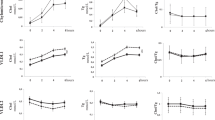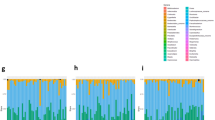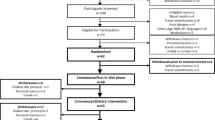Abstract
Objectives: To compare effects on plasma total-, LDL-, and HDL-cholesterol concentrations of margarines enriched with different vegetable oil sterols or sitostanol-ester.
Design: A randomized double-blind placebo-controlled balanced incomplete Latin square design with five treatments and four periods of 3.5 weeks. Margarines enriched with sterols from soybean, sheanut or ricebran oil or with sitostanol-ester were compared to a non-enriched control margarine. Sterol intake was between 1.5–3.3 g/d. Two thirds of the soybean oil sterols were esterified to fatty acids.
Setting: Unilever Research Laboratory, Vlaardingen, The Netherlands.
Subjects: One hundred healthy non-obese normocholesterolaemic and mildly hypercholesterolaemic volunteers aged 45±12.8 y, with plasma total cholesterol levels below 8 mmol/L at entry.
Main outcome measures: Plasma lipid, carotenoid and sterol concentrations, blood clinical chemistry and haematology, fatty acid composition of plasma cholesterylesters and food intake.
Results: Ninety-five volunteers completed the study. None of the margarines induced adverse changes in blood clinical chemistry, serum total bile acids or haematology. Plasma total- and LDL-cholesterol concentrations were significantly reduced by 8–13% (0.37–0.44 mmol/L) compared to control for margarines enriched in soybean oil sterol-esters or sitostanol-ester. No effect on HDL-cholesterol concentrations occurred. The LDL- to HDL-cholesterol ratio was reduced by 0.37 and 0.33 units for these margarines, respectively. Effects on blood lipids did not differ between normocholesterolaemic and mildly hypercholesterolaemic subjects. Plasma sitosterol and campesterol levels were significantly higher for the soybean oil sterol margarine and significantly lower for the sitostanol-ester margarine compared to control. Dietary intake was very similar across treatments. The fatty acid composition of plasma cholesterylesters confirmed the good compliance to the treatment. All sterol enriched margarines reduced lipid-standardized plasma α- plus β-carotene levels. Plasma lycopene levels were also reduced but this effect was not significant for all products.
Conclusions: A margarine with sterol-esters from soybean oil, mainly esters from sitosterol, campesterol and stigmasterol, is as effective as a margarine with sitostanol-ester in lowering blood total- and LDL-cholesterol levels without affecting HDL-cholesterol concentrations. Incorporation in edible fat containing products of such substances may substantially reduce the risk of cardiovascular disease in the population.
Sponsorship: Unilever Research.
This is a preview of subscription content, access via your institution
Access options
Subscribe to this journal
Receive 12 print issues and online access
$259.00 per year
only $21.58 per issue
Buy this article
- Purchase on Springer Link
- Instant access to full article PDF
Prices may be subject to local taxes which are calculated during checkout
Similar content being viewed by others
Author information
Authors and Affiliations
Rights and permissions
About this article
Cite this article
Weststrate, J., Meijer, G. Plant sterol-enriched margarines and reduction of plasma total- and LDL-cholesterol concentrations in normocholesterolaemic and mildly hypercholesterolaemic subjects. Eur J Clin Nutr 52, 334–343 (1998). https://doi.org/10.1038/sj.ejcn.1600559
Received:
Revised:
Accepted:
Published:
Issue Date:
DOI: https://doi.org/10.1038/sj.ejcn.1600559
This article is cited by
-
Plasma fat-soluble vitamin and carotenoid concentrations after plant sterol and plant stanol consumption: a meta-analysis of randomized controlled trials
European Journal of Nutrition (2017)
-
Lipase-catalyzed transesterification of soybean oil and phytosterol in supercritical CO2
Bioprocess and Biosystems Engineering (2015)
-
Lycopene; chemistry, biosynthesis, metabolism and degradation under various abiotic parameters
Journal of Food Science and Technology (2015)
-
Consumption of a dietary portfolio of cholesterol lowering foods improves blood lipids without affecting concentrations of fat soluble compounds
Nutrition Journal (2014)
-
The effect of plant sterols on serum triglyceride concentrations is dependent on baseline concentrations: a pooled analysis of 12 randomised controlled trials
European Journal of Nutrition (2013)



